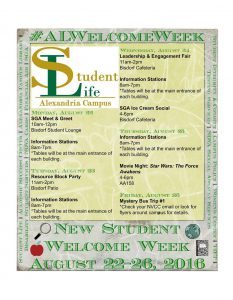Final Exams are Around the Corner.
Avoid stressful people.
Stress actually is contagious. During exam week, resist the urge to have a study session with your super-tense friend, especially if she’s complaining about all the work she has to do and breaking pencils all over the place. Her stress will only add to your stress.
Eat healthy and exercise.
This seems like a no-brainer, but it’s a wonder how many people forget it. Skip the sugar, which will make you crash, and go for snacks like granola bars, healthy cereal or fruits and veggies to keep your blood sugar stable. If you’re studying for a long period of time, eat some protein too. Also, try to get some form of exercise. Even a 10 minute walk will leave you calmer and more focused.
You’re Winning @ NOVA
Testing Center Tips for Fall Midterms
You’re Half Way There!
 You’re coming up on the halfway point in the semester. How are you doing? Great? Not so good? Or can’t tell, because you don’t have usable goals?
You’re coming up on the halfway point in the semester. How are you doing? Great? Not so good? Or can’t tell, because you don’t have usable goals?
Goals are the basis of all your plans.
You have to get good at goal setting and achieving. Here are the four steps you must do, over and over:
- Where are you now? Be honest.
- Where do you want to be? Set your goals.
- Plan backwards, step by step. Look at the intermediate steps to lead you there.
- Find the steps you can take tomorrow. Take action immediately! As soon as possible! There is always something you can do now to move you forward.
Action step:
Right now, schedule time away from your friends and unplug. 1 hour minimum. 1 full day is better. Use that time to do this review.
Testing for Success!
Achieving Balance

Achieving life balance is an ongoing process. Corey Keyes refers to optimal life balance as “flourishing” (Keyes, 2002). Flourishing is experienced when all areas of your life are working together in the best possible way. When you flourish, you feel happy and satisfied; have high levels of emotional well-being; feel that your life has purpose; accept all parts of yourself; are capable of growing, evolving, and changing; and have a strong sense of autonomy and internal locus of control (Keyes, 2002). Flourishing means that you’re being the best version of yourself.
Flourishing and achieving life balance while enrolled in college involves establishing a support network, getting involved in activities outside of your course work, taking care of your health and wellness, establishing strategies to help manage and reduce stress, and exploring your career options and future possibilities.
There are many areas of our life to bring into balance. Usually we’re better at taking care of our needs in some areas of our life, but in other areas there is room to reflect and improve. To consider which areas of your life may need more attention, check out some of the quizzes below aimed at determining your balance across multiple areas of wellbeing. Each quiz is a bit different, but you may find the results from one will offer insight you can use to prioritize some goal setting around areas of your life you’d like to develop further. Once you’ve set some goals for yourself, seek out resources, and make commitments to changing your habits toward the positive.
Remember that finding balance is an ongoing process. There will be times throughout the year when you will feel like you’re flourishing, and, most likely, there will be times when the term is difficult and you do not feel like you’re flourishing. That’s okay. Keep in mind that achieving balance and flourishing are life-long pursuits. Change can be gradual; one small step in the right direction will build momentum and the repercussion of that step might have a significant impact on your productivity, outlook, and overall academic pursuits.
http://success.oregonstate.edu/learning-corner/achieving-balance
Thanks Oregon State.
Happy Labor Day!
Start Strong!
Eight tips to start the new school year
Tips for a new school year start
The summer holiday is over. It is time to think of the new school year. And while some are eager to know their new teacher and meet their friends to tell them about all their summer adventures, others are more worried about the new year. Here are some tips for a smooth school year start that will help you beat the stress and organize your study environment.
Reconnecting with a healthy lifestyle
During holidays, children have often been allowed to sleep late and eat a little of what they wanted at any time. The first thing to do is to help yourself make a smooth start and not to wait until the last day to find a healthy lifestyle. You should get used to have regular and reasonable hours of sleep and to eat healthy food. This of course needs several days of “rehabilitation”. The ideal thing is to start reconnecting with a healthy lifestyle one week to ten days before school starts.
Buy study resources
Buy all the resources available for your grade. This will help you tremendously do your homework rightly. The resources may include a good dictionary, an encyclopedia, educational softwares…
Create a pleasant study environment
A few days before school starts, do a tidy-up of the desk and the shelves. Sort and throw away the relics of the past year. Donate your old books, pens and school things if they are still usable. Clean up your desk. Make it a comfortable place to do your homework. Your workplace should be a quiet well-lit corner where it feels good.
Find your way to your new school
If you change your school, you need to learn how to find your way from your home to the new school. Start building new relationships in your new school environment. It will be easy for you to make new friends if you are willing to. Your new friends will certainly show you the places around the school. Your new teachers will also be happy to introduce you to your classmates.
Developing dialogue
If you feel anxious of the new school year, it is very important to talk to your parents about your fears. They will surely find a way to help you get over your fears and gain confidence. They will certainly show you that they believe in your abilities, and will be willing to help you with your first pieces of homework if need be. It is also essential that you develop self confidence and believe in your own potential.
Beat stress
If you are overly anxious about performance, work through your negative beliefs, especially the beliefs about the implications of school failure. Challenge your negative thoughts that your worth as a person or future prospects hinge entirely on your grades. Good performance will be achieved only when you beat your fears and discover your own personal worth.
Set goals
Enjoy setting goals for yourself, so you can transcend your weaknesses and reach your full potential. Your study goals must be realistic and achievable. For example, start with small steps to reach higher targets.
Motivation
Achieving some goals will certainly motivate you to reach more challenging targets. Another motivating factor would be to understand that you work primarily for yourself and your future career. Apart from the external rewards that your parents may promise you, you must understand that studying well is your chance for self development.
Testing Center Hours, August 18th!
Fall CONVOCATION Testing Center Hours
12:30 – 9:00 p.m.




